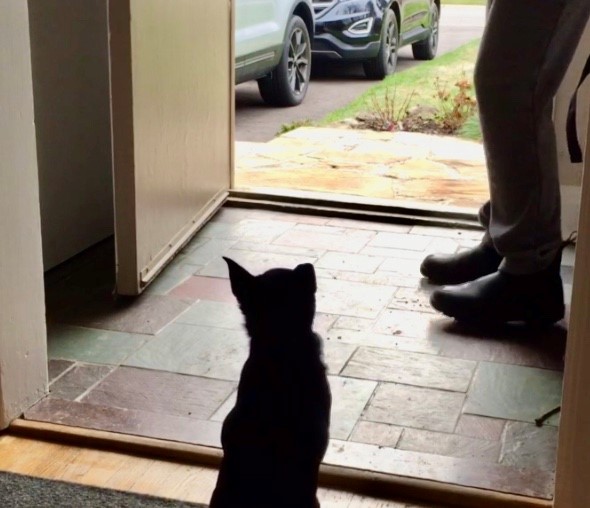Using The Power of Permissions For Successful Pet Dog Training
Many of us have dogs that are simply stealing things they want
I’m sure most of us are familiar with this conditional probability statement:
if x, then y.
In other words: given some event x occurs, y event will follow.
Come again?
Is this about math, Nanette?
Well, there won’t be number crunching.
But that is how I use permissions to successfully teach pet dogs pretty much anything.
A few weeks ago, these two dogs stayed over at my place as boarders while their family was away.

They are both on my bed, which they earned from doing incredibly simple tasks: I simply wanted them to touch their noses to my palm.
I held my flat hand open and waited for their choice to drive their nose into my hand. When they did, then I gave them permission to hop onto my bed.
That was it.
I didn’t verbally cue them, to avoid them ignore the cue or risk myself repeating the word.
I simply held my hand flat. I set each dog up for success by having my hand about 6 inches away from their noses, so that there was just one option for them to succeed. Had either dog displayed body language indicating discomfort with my flat hand being close to their faces, I would have increased the distance from my hand or reinforced their comfort by using super high value rewards applicable to each dog. I relied a lot on my prior observations about what each dog valued, from food to toys to interactions with me.
Fortunately, both dogs quickly grasped the conditional: if this person holds her palm flat, then we poke our nose into her palm, and then we can go onto the bed.
No bribes with food or punishment or even verbal intimidation.
Just clarity.
I do that often with many of my pet sitting charges.
Similarly, my personal dogs are educated the same way.
Before I open my front door to let my dogs go outside, they learn that the choice they make in front of the door is the Open Sesame.
In particular, the dog’s choice of offering a stationary position (a sit, down, or stand) initiates the door opening. For the door to open, the position must be held. Once the dog holds the position, they may then receive permission to cross the threshold of the open door, which is the release cue (word).

Photo credit: author
In my humble opinion, dogs’ behaviour reflects their trainer’s familiarity with reinforcement. Certainly, there are dogs that have been educated using verbal intimidation and physical punishment. Those dogs have learned to be afraid. In psychology, the resulting behaviours indicate learned helplessness, where a dog learns nothing but to give up because of repeated punishment (Maier & Seligman, 1976).
Research and social change demonstrate increasing awareness of dog emotions and welfare (Todd, 2018; China et al., 2020). Given the veterinary industry having so much influence on companion animal welfare, I hope this field continues driving the change towards regulating the dog training industry.
Sources cited
China, L., Mills, D. S., & Cooper, J. J. (2020). Efficacy of Dog Training With and Without Remote Electronic Collars vs. a Focus on Positive Reinforcement. Frontiers in veterinary science, 7, 508. https://doi.org/10.3389/fvets.2020.00508
Maier, S. F., & Seligman, M. E. (1976). Learned helplessness: theory and evidence. Journal of experimental psychology: general, 105(1), 3.
Todd, Z. (2018). Barriers to the adoption of humane dog training methods. Journal of Veterinary Behavior, 25, 28-34.









